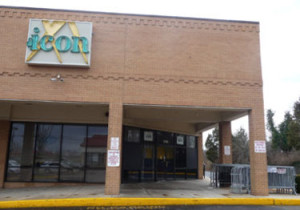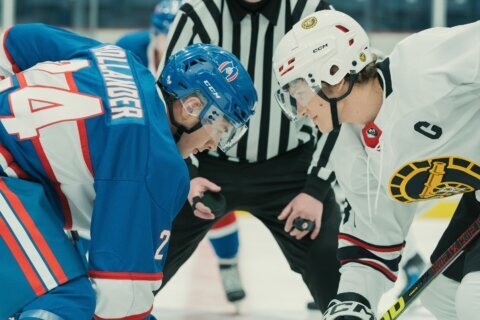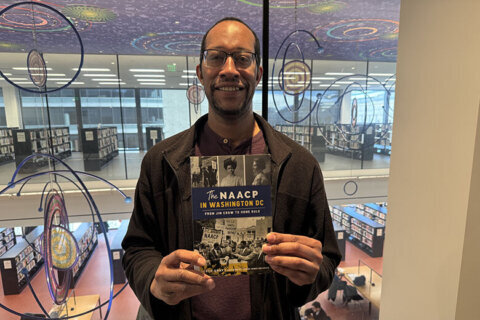Gary Emerling, wtop.com
Editor’s Note: The 2008 fatal shooting of 13-year-old Alonzo Robinson in the Trinidad neighborhood of D.C. helped spark the second incarnation of the Metropolitan Police Department’s now dormant Neighborhood Safety Zones initiative and focused attention on the violence taking place in the city’s Northeast quadrant.
Now, nearly three years later, a trial for the young men accused in the events surrounding the teenager’s death is expected to begin. In a three-part series, WTOP takes a look at the night of Robinson’s death, the response by city police and the subsequent search for justice.
—————-
Part III: The search for justice
WASHINGTON – The Icon Bar & Lounge in Waldorf, Md. occupies the far end of a brick strip mall off of Crain Highway.

The club in winter daylight resembles a ghost town, but there are clues to a busy nightlife: Signs on the brick pillars fronting a triangular portico warn against loitering and consuming alcohol on the blacktop parking lot, while metal crowd control barriers lean in disuse between the tall columns.
A peek inside the glass front doors shows a metal detector standing in front of a blue and yellow wall. A sign nearby lets patrons know they are being videotaped due to “recent illegal activities.”
The Icon is roughly 20 miles and 40 minutes from the Trinidad neighborhood of D.C. But it is here, according to authorities, where the events leading to Alonzo Robinson’s murder began to unfold.
The night of July 18, 2008, officials say two groups of young men decided to spend their respective Friday nights at the Icon. Among them was William McCorkle, who two weeks later would be arrested and accused in the BP gas station triple murder — an incident that resulted in the deaths of Duane Hough, Johnny Jeter and Anthony Mincey and helped spark the first implementation of the Trinidad Neighborhood Safety Zones.
Authorities say McCorkle — whose neighborhood nicknames were “Fudge” and “Strap” — was joined at the club by friends Marcus Brown, nicknamed “Chillay,” Antonio Dickerson, Jeffery Tuckson and others.
According to authorities, some members of the group were more than tight-knit neighborhood friends: McCorkle and Brown, at least, were part of a Trinidad-based gang with the nickname “1300.” The group’s activities allegedly included drug trafficking and striking back against anyone who stood in their way.
“Members of and active participants in the Trinidad criminal street gang used violence, which at times included murder, attempted murder, and threats of murder, to promote, protect, and expand the gang’s drug trafficking operation … to retaliate against rival gangs or those who interfered with the drug trafficking activities of the Trinidad gang, and to promote and enhance the prestige, reputation, and position of the Trinidad criminal street gang,” court documents state.
On this particular Friday night, the Trinidad group reportedly ran into another neighborhood contingent at the Maryland club. Authorities say Antonio McAllister — nicknamed “Tone” or “Tone Loc” — and his friends came to Waldorf from Kenilworth, a city neighborhood on the eastern side of the Anacostia River and tucked inside the D.C.-Maryland border.
At some point, according to court documents, a fight ensued and the Kenilworth crew was ejected from the club.
Authorities say the group wouldn’t let the incident go.
***
Sometime after the run-in with the Trinidad crew, Antonio McAllister and his friends began to formulate a plan, according to authorities.
McAllister and several others, including twin brothers Joshua and Christian Benton — at whose home authorities reportedly found a graffiti portrait of two pistols underneath the words “Twin Glocks” — agreed to drive to Trinidad and “shoot individuals affiliated with the Trinidad neighborhood,” court documents state.
Documents say McAllister and the Benton brothers all sported dreadlocks, and the group’s mode of transportation into Trinidad was a gold Dodge Intrepid.
***
One member of the Kenilworth crew later turned government witness and detailed the night’s incidents to police, documents say.
According to him, McAllister got behind the driver’s seat of the Intrepid, with Joshua Benton next to him on the front passenger’s side. Christian Benton sat behind his brother, while another person nicknamed “Mike-Mike” wedged between him and the unidentified witness in the middle of the back seat.
At about 2:30 a.m., the car pulled onto the 1400 block of Staples Street in Northeast, near three people outside. Members of the group “assaulted Ricky Boyd Jr. and Angela Cherry with firearms, and then repeatedly shot Rishad General as he lay on the ground,” documents state.
After getting back inside the car, documents say Joshua Benton placed his 9 mm in the middle console, between himself and McAllister.
McAllister then reportedly steered the Intrepid one block away.
“When the car turned onto Holbrook Street, a group of persons were standing … on the driver’s side of the car and Antonio McAllister pulled up next to them,” an affidavit in the case states.
The group consisted of Alonzo Robinson, his mother Marcella, and their two cousins. The car pulled to a stop beside Marcella.
“What’s up?” said a voice from inside the car.
McAllister picked up the 9 mm from the middle console, documents say, and he and the cooperating witness opened fire.
***
The shots in the 1500 block of Holbrook Street killed Alonzo Robinson, struck his mother Marcella in the arm and grazed her cousin’s neck.
The Kenilworth crew then drove south, and the cooperating witness said Christian Benton fired out the window at another person in the area. Authorities say that person was Antonio Dickerson.
Dickerson was hit and injured, and word of his wound apparently spread fast. According to authorities, Dickerson’s friends — including McCorkle, Tuckson, Brown and Kevin Gross — wanted their own revenge.
“The Trinidad Defendants believed that individuals from the Kenilworth neighborhood shot Dickerson in retaliation for the fight at the Icon club earlier that morning,” the government says.
“Accordingly, the Trinidad Defendants decided and agreed to retaliate against, and to assault and kill, individuals from or associated with the Kenilworth neighborhood who were believed to be responsible for shooting Dickerson.”
Authorities say the Trinidad group obtained weapons before Tuckson, Gross and McCorkle drove in a silver or gray Infiniti to Kenilworth, where they saw a target: Antonio McAllister.
Gunfire erupted and injured two people, but not McAllister. Authorities say a Kenilworth suspect fired back, and the Trinidad group returned home.
***
On Dec. 3, 2008, Metropolitan Police Chief Cathy Lanier and D.C. Mayor Adrian Fenty announced they had taken Antonio McAllister, then 18, and Joshua Benton, then 19, into custody and charged them with first-degree murder in Alonzo Robinson’s death.
Nearly a year later, in September 2009, McAllister and both Benton brothers were indicted on charges including first-degree murder, conspiracy and assault with intent to kill while armed. Also listed on the indictment — though not charged with murder — were Trinidad defendants Marcus Brown, Kevin Gross, Jeffery Tuckson and William McCorkle.
A joint trial for five of the defendants is tentatively scheduled to begin this week — approaching three years after Alonzo Robinson and others were shot in July of 2008.
At a recent hearing in the case, the suspects — at the time, three from Trinidad and three from Kenilworth, all dressed in orange jumpsuits — sat side by side in the same row. (One suspect, Gross, has since entered into an agreement to have the case against him dismissed after pleading guilty in another case in federal court. A status hearing for Tuckson is scheduled for April.)
Six U.S. Marshals watched over the courtroom, outnumbered by seven defense lawyers and two federal prosecutors.
The defendants are being tried together because they are linked by the retaliatory nature of the shootings — “one offense logically leads to the other,” prosecutors say in court documents.
The sheer amount of attorneys in the case explains in part the gap between crime and criminal trial. Motions have been filed, and calendars discussed. The admissibility of evidence has been disputed. Even judges in the case have changed since it first came to court.
Still, at least one key issue appears to be pending prior to the trial: the competency of the government’s cooperating witness. According to defense attorneys for McAllister and the Bentons, the witness has a history of “extensive psychiatric issues and extensive hallucinogenic drug use” and may not be competent to testify.
Prosecutors, however, contend the witness previously has been deemed competent in court and some of his complaints of mental health issues appear to have been ploys to gain a change in jail housing.
D.C. Superior Court Judge Thomas Motley has scheduled a hearing on the issue for Tuesday.
The case also carries with it exterior complications. For example, McCorkle’s separate case related to the 2008 triple murder at the BP gas station is set for trial later this year.
Brown also faces charges of perjury and obstruction of justice related to McCorkle’s and another person’s alleged shootings at the station. And the case’s indictment includes a contention that Brown lied before a grand jury about asking for a gun the night of the Trinidad-Kenilworth feud.
The U.S. Attorney’s Office and defense attorneys for McAllister and the Benton brothers have declined or not returned calls seeking comment on the joint case. But the web of alleged criminal activity creates a perilous line for the lawyers to tread.
Judge Motley has said he will not allow evidence from the triple homicide case to be used in the joint proceeding, and is intent on moving the case to trial.
“It’s almost like marriage,” the judge told attorneys at the recent hearing as they aimed to solve disputes. “Speak now or forever hold your peace.”
***
The December 2008 arrests of Antonio McAllister and the Benton brothers allowed Lanier to bring some sense of closure to the Alonzo Robinson murder — a homicide overshadowed by controversial police checkpoints and now forgotten by many.
“I promised the Trinidad community months ago that I would not stop until those responsible for Alonzo’s murder were brought to justice,” Lanier said when announcing the arrests of McAllister and Joshua Benton.
For Marcella Robinson, though, there has been no closure. She cannot sleep. Loud noises scare her. Alcohol is an escape.
She questions — over and over — what she could have done to save her young son’s life.
Something. Anything.
“It’s horrible,” she says. “I think I’m officially in hell.”
Marcella, who still lives in Alabama, says she had no knowledge until recently that the case against her son’s accused killers was set for trial. Word from police and prosecutors came only within the last several weeks.
She says she expects to testify in the case, meaning she will relive the night Alonzo died all over again, as she already does.
Every day.
“They shot my baby seven times,” she says. “I got a lot on my mind.”
***
(Copyright 2011 by WTOP. All Rights Reserved.)







